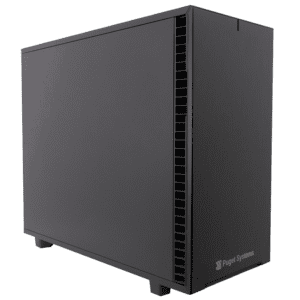Earlier this week Microsoft made public the release candidate for their next OS – Windows 7. It is available as a free download from them, which will be good until March of 2010 (with limited usability for a few months after that)… so like many other tech enthusiasts I downloaded it and gave it a spin.
NVIDIA GTX 295: Bad choice for liquid cooling?
I’ve always had a rocky relationship with dual GPU video cards. Our first bad experience was with the NVIDIA 7950GX2, which we found over time to suffer from higher shipping damage rates. The NVIDIA 9800GX2 was even worse. Now the NVIDIA GTX 295 is the major NVIDIA dual GPU card on the market. Are we set up for a repeat experience?
OS Trends Over Time: XP vs. Vista, 32-bit vs. 64-bit
This weekend, Puget Systems updated many of our preconfigured systems to default to Windows Vista 64-bit. This is in direct response to a dramatic increase in popularity of 64-bit over the last few months. As part of my research in making this call, I took a look at our operating system sales over the last few years. I found the data interesting, so I thought I’d share that data, as well as my thoughts!
How accurate is ResellerRatings.com?
The website ResellerRatings.com has been around for a very long time, and is the de facto standard for checking out just about any online retailer in the industry. It provides a place for unbiased reviews of companies by people who have purchased in the past. However, in the last few years it has become increasingly easy to get a 9/10 score or better. Can the scores still be trusted, or has ResellerRatings.com become nothing more than a marketing platform? If so, how is that possible if the reviews cannot be affected by the companies being reviewed?
Are Extreme PCs Going Away?
On Monday, Jason Perlow at Tech Broiler wrote about a $16,000 PC we had built, which has recently been making its way around blog headlines. He commented that “Extreme PCs” are no longer relevant, and asked his readers whether these types of PCs, along with build-your-own homebrew PCs were going extinct. It’s been interesting to read through the reader comments, and I wanted to add some perspective of my own.
How SEO Built Our Business
This isn’t a normal thing for me to blog about, but I’ve had the desire recently to share more about Puget Systems behind the scenes: what makes us tick, what we value, and how we do things. Search engine optimization, or SEO, is something that we have been particularly strong at. I want to talk about the misconceptions about SEO that are out there, talk about why we are strong at it, and why I’m not worried about sharing these secrets to our competition!
Building a $16,000+ PC
We’ve been receiving a lot of media, blog and Twitter attention regarding the “$16,000+ PC” we built late last year. While most of the reviews have been favorable, the comment fields have been their usual mix of reactions and name-calling. LOL! The extra attention has definitely been fun, although I think our web servers would disagree!!!
Intel Core i7 Temperatures
There has been quite a bit of talk recently about Intel Core i7 CPUs and what temperature they should be running. The Core i7 CPUs have a TDP of 130W, and run quite hot compared to the Core 2 Quad CPUs we’ve used in the past. How hot is too hot? A Google search shows that there is massive confusion and misinformation around the web. In the absense of good information, I decided to find out for myself. As an Intel Premier Provider, I talked to an Intel engineer, and am writing to tell you what I found.
The New Puget Office! – Construction Video
I’m very happy to be writing this post from our new offices, where we have been operating now for two weeks. When we bought a new warehouse last May, I can honestly say I had no idea how much time and effort it would take to get the construction done and our company moved. Now that we’re done, I’m excited to be back and focusing on the business (not the building!). Having purchased this building, there are two messages I want to make sure to put out there…
Our experiences with memory manufacturers
When it comes to memory manufacturers, we’ve been around the block…a few times. We’ve learned a lot in the process — too much to keep to ourselves! For each memory manufacturer we’ve used in the past, we have thousands of sticks of memory out in the field, and that gives us some good objective experience. I wanted to take a minute to comment on the various memory manufacturers we have experience with, share our stories, and to explain why we are standardizing on Kingston memory going forward.
